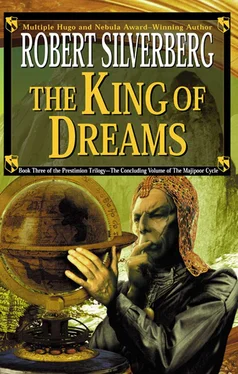They all must burn.
“Uncle?”
Burn! Burn!
Dumafice Moal turned the energy-thrower to a higher level, and a higher one still. A dull rosy glow sprang up in the bed of khemibors. Burn! Let the himmis-bugs cope with that! He went quickly from row to row, from bed to bed, from terrace to terrace. Spirals of greasy blue smoke began to rise from newly created heaps of ash. The trunks of trees were turning black with the scars of combustion. Vines hung in angular, disheveled loops.
There was much to do. It was his duty to purify the garden, all of it, here and now. He would work at it all day, and far into the night if necessary, and onward to the following dawn. How else could he cope with the unbearable burden of guilt that roiled the deepest recesses of his soul?
He moved on and on, torching this, blasting that. Clouds of ash now leaped up with every step he took. Black haze veiled the morning sun. An acrid carbonized taste invaded his nostrils. The boy followed along behind him, astounded, dumbstruck.
Someone was calling down to him from a higher terrace: “Dumafice Moal, have you gone insane? Stop it! Stop!”
“I must,” he called back. “The garden is shameful to me. I have failed in my duties.”
Sparks were flying all around, now. Trees blossomed into bright flame. Here and there, huge blazing limbs broke free and toppled, shrouded in red, into the plantings below. He was aware that he was doing some damage to the gardens, but not nearly so much as these insects and animals and fungoid pests had achieved. And it was necessary damage, purgative damage. Only through fire could the garden be purified—could he be absolved of his shame—
He went on, beyond the alluailes and the flask-trees, deep into the navindombe bushes now. Behind him rose a dark, red-flecked mist of smoking embers. He aimed the energy-thrower here, here, here. Trees crashed in the distance. Enormous boughs landed with the soft sighing impact of wood that has burned from the inside out: dream-branches, dream-light. Cinders crunched underfoot. The ash was a thick, soft black powder that rose in choking puffs. The sky was turning red. A savage gloom prevailed everywhere. He no longer felt the pain at the top of his skull, no longer felt the guilt, even, of his failure—only the joy of what he was achieving now, the triumph of having restored purity to what had become impure, of having negated negation.
Angry voices cried out behind him.
He turned. He saw stunned faces, goggling eyes.
“Do you see?” he asked them proudly. “How much better it all is, now?”
“What have you done, Dumafice Moal?”
They came rushing through the cinder-beds toward him. Seized him by the arms. Threw him down, bound him hand and foot, while all the while he protested that his work was still unfinished, that much remained yet to be done, that he could not rest until he had saved the entire garden from its foes.
Word was beginning to spread up and down Castle Mount and outward into the lands beyond: the old Pontifex Confalume was dead, Lord Prestimion had gone to the Labyrinth to take the senior throne, Prince Dekkeret of Normork was to become the new Coronal. Already the portraits of the late Pontifex were being brought out of storage and put on display, bedecked now with the yellow streamers of mourning: Confalume as a vigorous young lord with bright keen eyes and a thick sweep of chestnut hair, Confalume the beloved gray-haired Coronal, Confalume the regal old Pontifex of the past two decades, whatever people could lay their hands on. Soon portraits of the new Lord Dekkeret would be generally available, and they would go up too on every wall and in every window, and, alongside them, pictures of the former Lord Prestimion, now Prestimion Pontifex, wearing the scarlet-and-black robes of his newly assumed high office.
Everywhere, preparations for great celebrations were getting under way: festivals, parades, pyrotechnic displays, tournaments, a worldwide holiday of joy. The arrival of a new Coronal on the scene was something of a novelty for modern-day Majipoor.
Over the thirteen thousand years of Majipoor’s history it normally happened only two or three times in a person’s life that a Pontifex died and new rulers came to the two capitals. But in the past century a change of monarchs had been even more of a rarity than that. Confalume had been Pontifex for the past twenty years, and Coronal for the forty-three before that. So more than sixty years had gone by since the
Pontifex Gobryas had died and was succeeded by the dashing young Lord Prankipin, who had chosen Prince Confalume to be his Coronal; and very few were still alive who remembered that day. Prankipin himself, dead some twenty years now, was only a name to the billions of younger folk who had come into the world during the Pontificate of Confalume.
The new Lord Dekkeret was not widely known outside the confines of the Castle—new Coronals rarely were—but everyone knew that he was a close and trusted associate of Lord Prestimion, and that was good enough. Lord Prestimion, like Lord Confalume before him, had been a greatly beloved Coronal, and there was general faith that he would choose a successor wisely and well.
Most people were aware that Dekkeret was of common birth, a young man of Normork who had first come to the attention of Lord Prestimion by thwarting an attempt on the Coronal’s life, back at the beginning of Prestimion’s reign. That was a most unusual thing, a commoner chosen to be Coronal, but it did happen every few hundred years. They knew that Dekkeret was a man of imposing stature and lordly mien, sturdy and handsome. Those who had had any contact with him in his travels through the world in his years as Prestimion’s designated heir had discovered that he was good-natured and easy of spirit, a man of open heart and generous soul. More than that, what sort of Coronal he would be, they would learn soon enough. Prestimion, throughout his years as king, had often left the Mount to visit cities far and wide. Very likely Dekkeret would do the same.
In the city of Ertsud Grand, midway up Castle Mount, the custodians of the Summer Palace began to make plans for an early visit by the new Coronal to the auxiliary residence that was maintained there for his use.
At this point such talk was, they knew, mainly wishful thinking. Ertsud Grand, a city of nine million people in the circle of the Mount known as the Guardian Cities, had been a favorite secondary residence of Coronals for centuries; but Lord Gobryas, who had come to the throne almost ninety years ago, had been the last one to make any regular use of the beautiful dwelling that was set aside for him there. Lord Prankipin had visited the Summer Palace no more than half a dozen times in his twenty years on the Mount. Lord Confalume, though, had gone there only twice in a reign two times as long. As for Lord Prestimion, he had never been to Ertsud Grand at all, and seemed altogether unaware that the Summer Palace existed.
Yet it was a beautiful palace in a beautiful city. Ertsud Grand was known as the City of Eight Thousand Bridges, though its citizens would always tell wondering visitors, “Of course, that’s an exaggeration. Probably there are no more than seven or eight hundred.” Streams from three sides of the Mount met and mingled there, providing the city with a watery underbedding before draining downward to create the Huyn River, one of the six that descended the slopes of Castle Mount.
A network of canals connected the various sectors of Ertsud Grand, so that it was possible to go all about the city by boat. All the main canals flowed toward the Central Market—which in fact was in the eastern half of the city, rather than being truly central—where, in a gigantic cobble-stoned plaza bordered by tall warehouses of white stone, luxury goods from every part of Majipoor were bought and sold. Here were dealers in unusual meats and fishes, in exotic spices, in voluptuous furs from the cold northern marches of Zimroel, in the green pearls of the tropical Rodamaunt Archipelago and the transparent topaz that was mined by night at Zeberged, in the wines of a hundred regions, in the small animals and strange insects that the people of Ertsud Grand favored as pets, and much more besides.
Читать дальше












